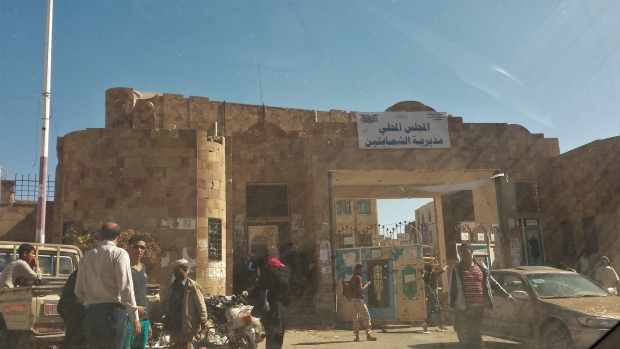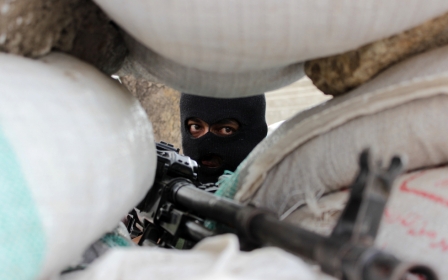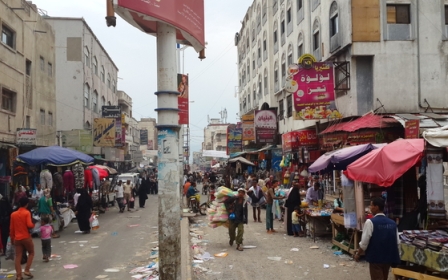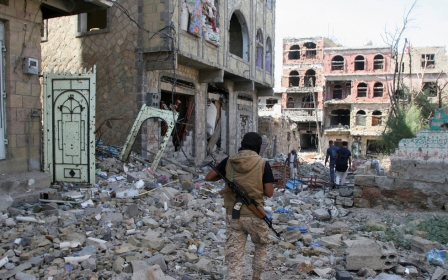Yemen government kicked out of Taiz by Popular Resistance
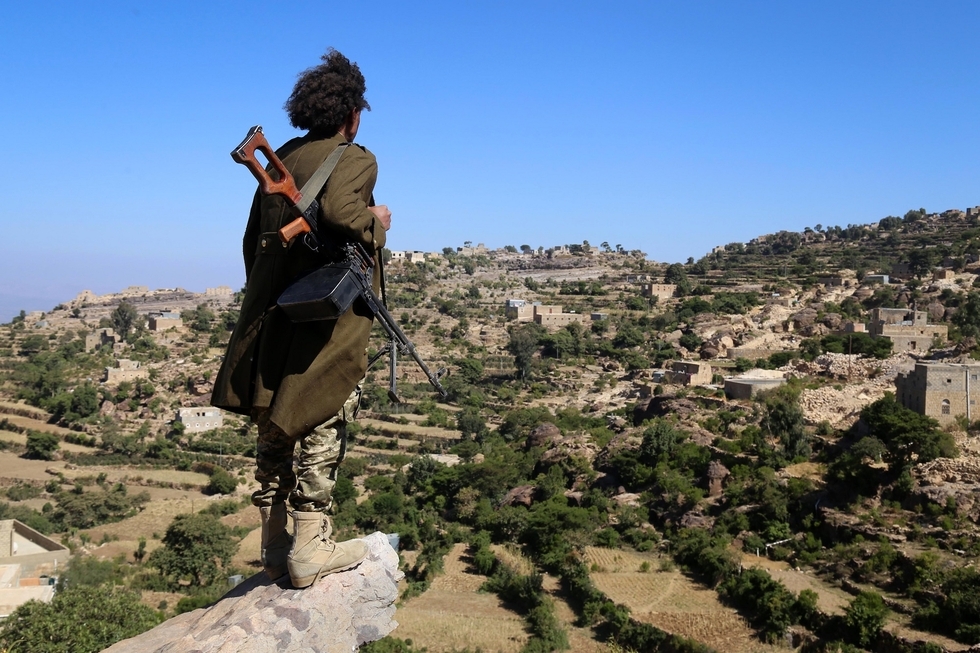
TAIZ, Yemen - Armed groups belonging to the "Popular Resistance" have taken over the government of large areas of Taiz province, kicking out civil directors appointed by the internationally recognised Yemen government and claiming corruption and lack of support in the battle against the Houthi rebels.
In an interview with Middle East Eye in the battle-scarred government compound in al-Turbah, Abu Hamza, the local leader of the Salafi "Hasm" group, said loyalists of President Abd Rabbuh Mansour Hadi had diverted taxes back to his powerbase in Aden, refused to pay public workers, and had done nothing to support the Popular Resistance as it fought to break a Houthi siege earlier this year.
In response, Abu Hamza and his men took control, kicking out the Hadi-appointed governors and taking over local ministries including health and education.
The 43-year-old is now the effective governor of al-Turbah and the surrounding al-Shimayateen district. It is a rise from humble beginnings. Abu Hamza worked as a restaurant cashier in Sanaa, the country's capital, before the war after gaining a management certificate at the the city's university.
"The government did not send us enough support, not even one minister has visited us in Taiz, and they are only sending us decisions of new appointments in different offices. This is ridiculous behaviour," he said.
"There are educated people inside the Popular Resistance, and we can manage everything in Taiz province, and do not need any appointments, neither from the Houthis nor Hadi's government."
The Popular Resistance groups were formed to defend against the advances of the Houthi rebels after they kicked out Hadi and took over Sanaa in September 2014.
But resistance leaders say they have received little aid from Hadi and his Saudi backers, even as Taiz fell under Houthi siege earlier this year. Local resistance fighters say they were left to break the stranglehold.
As a result, they are now the pre-eminent force in liberated areas, and there is deep resentment for the Hadi government among many in the resistance.
Abu Hamza stated that the Popular Resistance had worked hard to co-operate with the government, but it had failed to supply any local offices with a budget, and the government-appointed directors were interested only in sending local taxes to Aden.
"If the pro-Hadi government pays salaries of Taiz employees and supports the liberation of Taiz, we will let their directors work in Taiz," he said, "unless we are doing well in the province."
He denied that his men were not up to the job: "Some people accuse us of appointing illiterate people to manage some offices, but this is not true. The fighters of the resistance are not illiterate."
MORE: Taiz sinks into the abyss as Salafis fight war of revenge
The Hasm group's control of power is not welcomed by many spoken to by MEE.
Asem Hashim, an employee at the Civil Status Organisation, said that while he was not against the resistance for their efforts against the Houthis, they had gone a step too far by taking over local government affairs.
"No one can deny that the Popular Resistance liberated most of Taiz province, and they are doing good job in Taiz, but that does not mean the resistance has to ignore the government or remove the old directors and employees," he said.
"The Popular Resistance should accept the new directors of the government and let the employees work under their observation."
Hashim stated that some of the government-appointed directors had mostly left for Aden, while others were stuck at home without work.
The militarised nature of the Popular Resistance means their power is on display in al-Turbah and beyond; men with guns dominate civic institutions.
There is not a single street free from armed men. The resistance says they are stationed here for security. To ordinary civilians, their presence brings the possibility of violence.
I want to see public employees in the public institutions... and no one wants to see armed men in hospitals - Azzam al-Hakimi, nurse
Azzam al-Hakimi, a nurse in Taiz city who is against all armed groups, said gunmen could be seen everywhere.
"When I enter a hospital or the office of education, I don't want to see armed men. There is no danger threatening those institutions," he said.
"The armed men have to go to battle or stay at their military camps, but not inside public institutions.
"Sometimes clashes break out in the middle of the city or near to public institutions between fighters of the resistance.
"I want to see public employees in the public institutions, as before the war, and no one wants to see armed men in hospitals."
MORE: Catching a break in Yemen's crucible of war
Fadhl al-Rabie, a political analyst and the head of Madar Strategic Studies Centre, said the resistance should focus on fighting and co-ordinate with the Hadi government to manage the public institutions.
He said that some of the Popular Resistance groups were opposed to the government headed by President Hadi, while others were supporters.
"The Saudi-led air strikes are targeting the Houthis rebels in co-ordination with the Yemeni army and the Popular Resistance, so there is co-ordination between the resistance and the government. Only some groups of the resistance are against the government."
There are about 10 groups of the resistance in Taiz province, meaning competing agendas and a difficult reconciliation when the war against the Houthis ends.
Hasm is one of the biggest groups inside the Taiz resistance, though its chief, Adnan Rozaiq, is originally from Shabwa. The province is a stronghold of al-Qaeda in Yemen, but Hasm rejects any links to the group.
Rabie told MEE: "The government has to support the resistance and unite its different groups under one leadership, or merge them with the army, to avoid any future problems."
No money, more problems
While the arguments between local resistance fighters and the Hadi government continue, those stuck in the middle get nothing: no one is getting paid.
The resistance does not pay government employees in areas it controls. Nor does the Hadi government. Nor do the Houthis.
Saleem Abdulkareem, a teacher in Taiz city, says he has not seen any money for three months.
We are the only employees in the country that have not received anything since July - Saleem Abdulkareem, teacher
"The Houthi government paid the half of September salary only for employees in the areas under their control, and the pro-Hadi government paid salaries in the southern provinces, but no one paid the employees in the liberated areas in Taiz," he said.
"If resistance leaders do not want the government to manage the liberated areas in Taiz, they have to pay our salaries.
"We are the only employees in the country who have not received anything since July."
The employees and other residents in Taiz province fear the Popular Resistance and cannot protest against them. So, they say, the Popular Resistance behaves freely in the province.
Abu Hamza defended his actions: "We do not send taxes to the Hadi government, but we pay for services such as water and cleaning. We also pay security forces and traffic wardens. We do not steal the incomes of the liberated areas."
Middle East Eye contacted spokespeople for the Hadi government in Saudi Arabia, and the Yemeni embassy in London.
The embassy said it was not aware of the situation in Taiz. The Ministry of Foreign Affairs, based in Riyadh, did not reply to repeated requests for comment.
New MEE newsletter: Jerusalem Dispatch
Sign up to get the latest insights and analysis on Israel-Palestine, alongside Turkey Unpacked and other MEE newsletters
Middle East Eye delivers independent and unrivalled coverage and analysis of the Middle East, North Africa and beyond. To learn more about republishing this content and the associated fees, please fill out this form. More about MEE can be found here.


